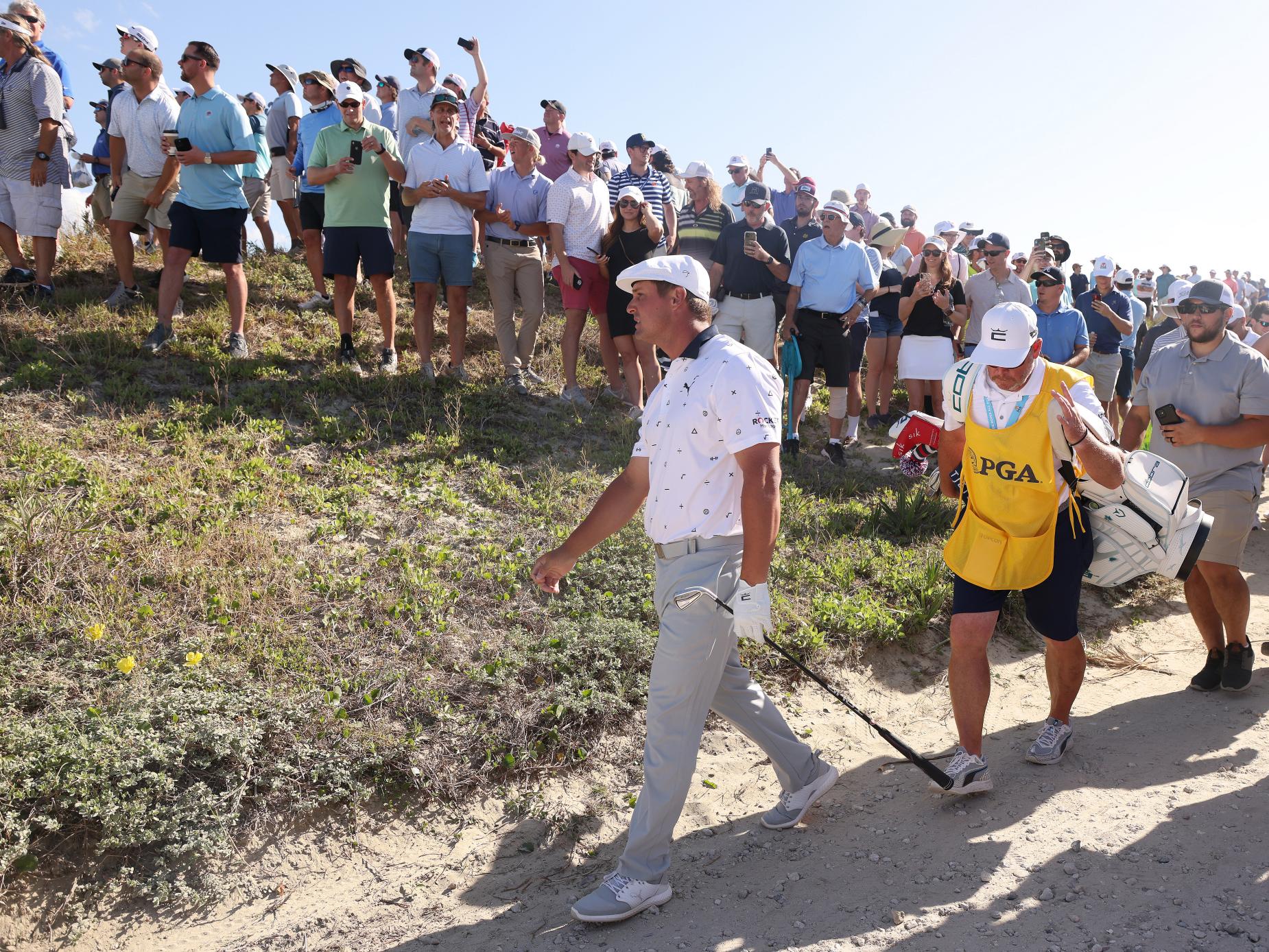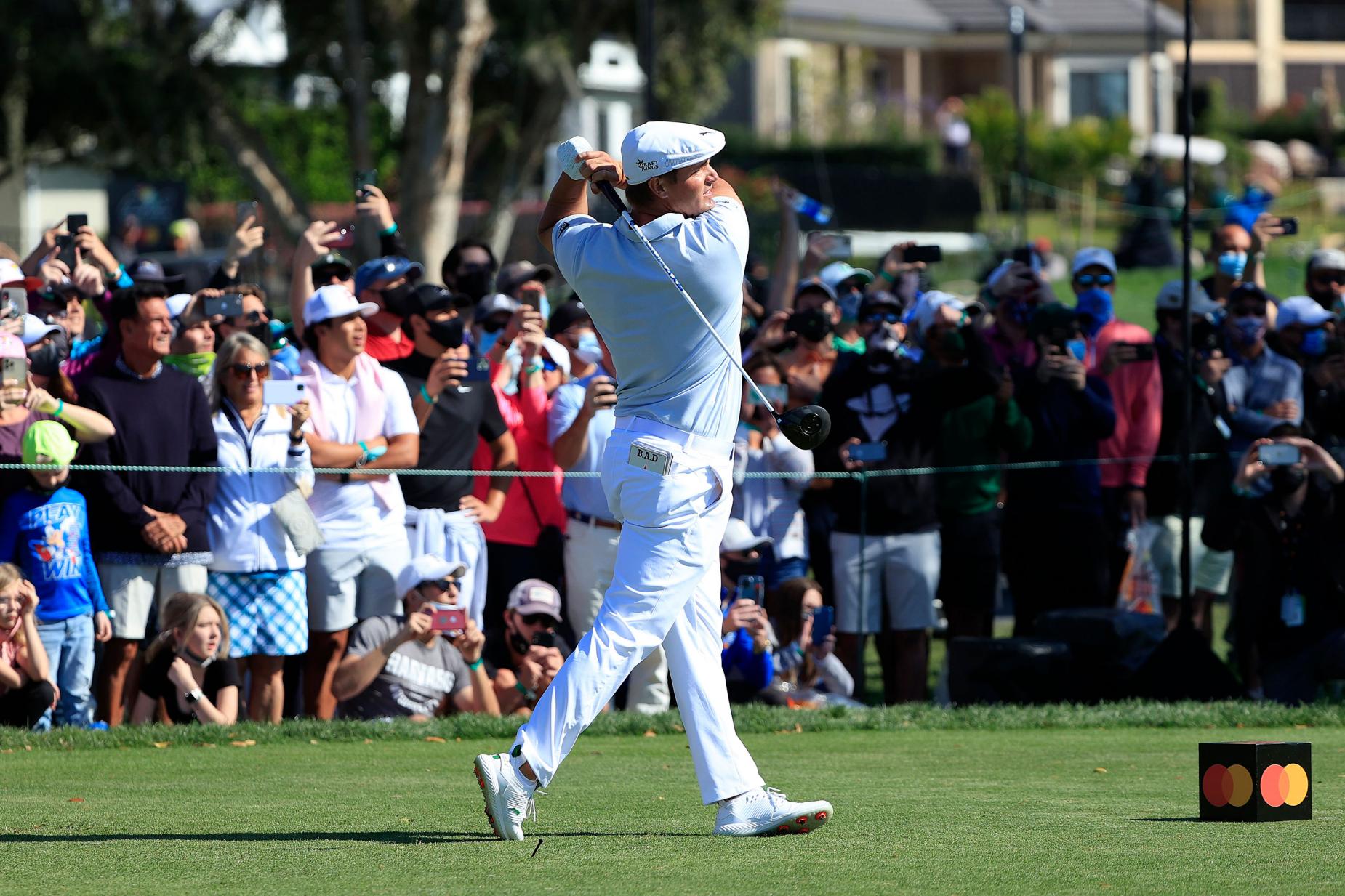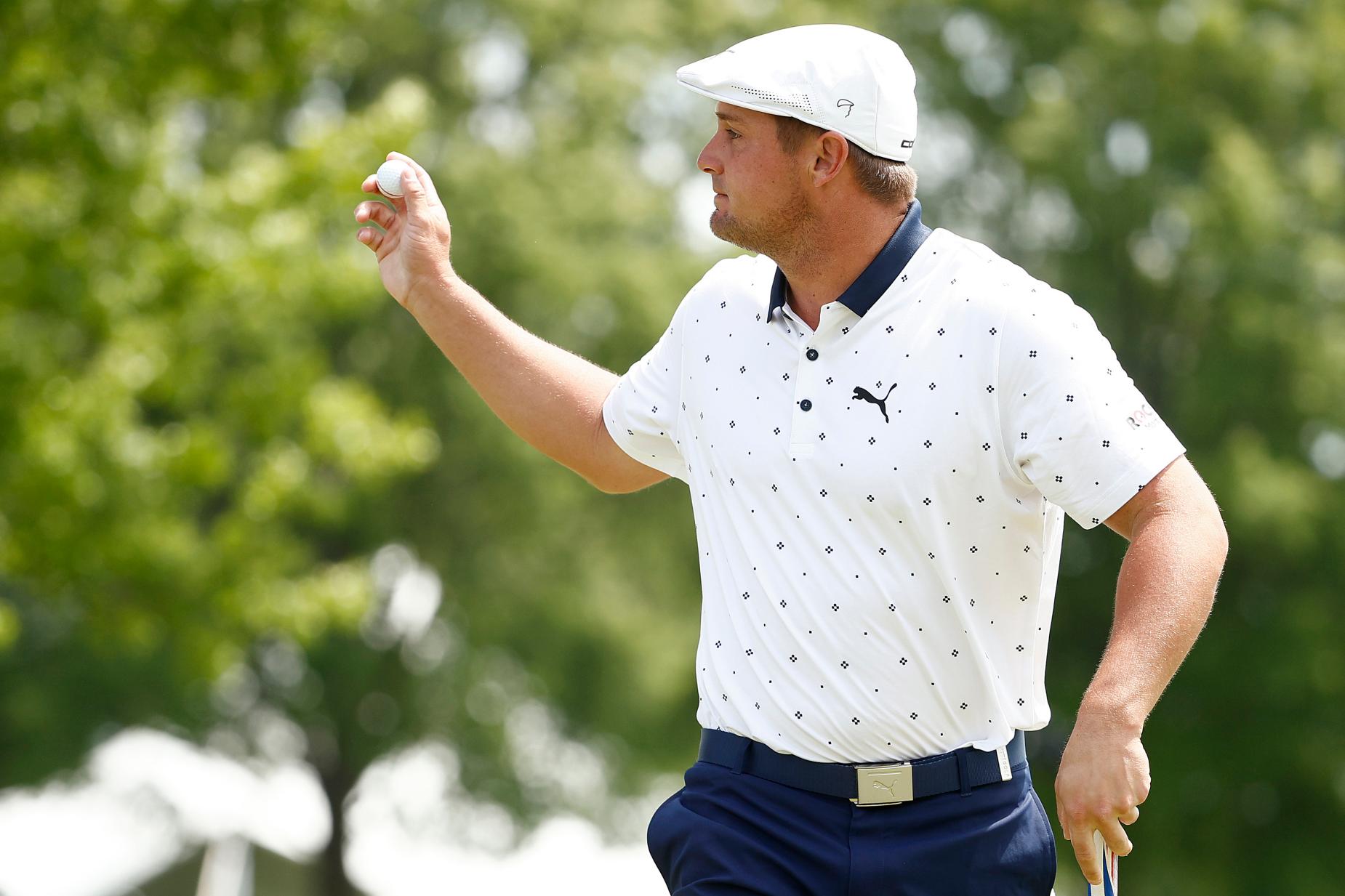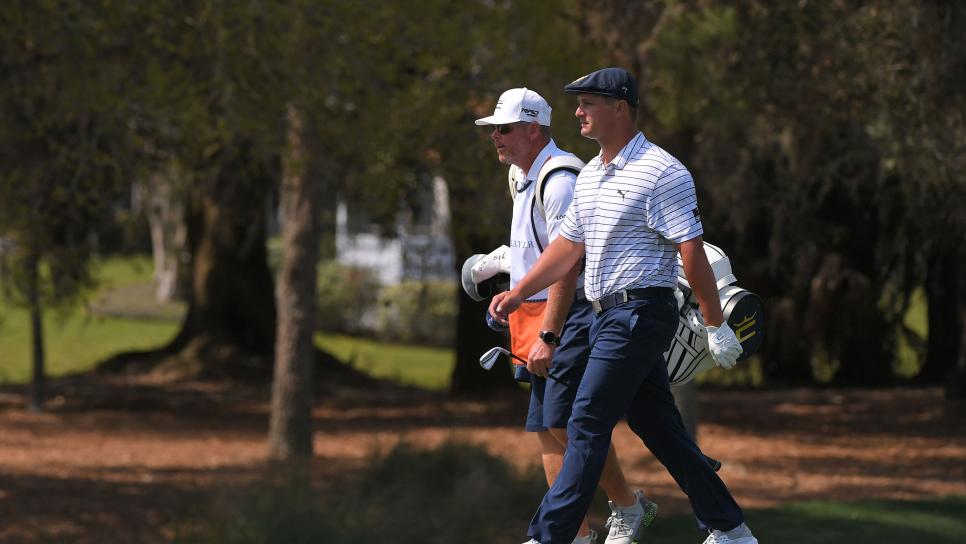Photo By: Ben Jared
By Joel Beall
The volunteers were on the back of a shuttle that was barreling past the storefronts of Mamaroneck, N.Y., to a town playground that was serving as a parking lot. It was late, later than they thought they’d leave Winged Foot, even on a final-round Sunday. Most were tired, and a vocal few were miffed. It was not the time of day that annoyed them but rather who conquered the day.
“Six under! Didn’t think anyone would do that. Didn’t think he would make the cut!”
“Why? If I knew the course would be set up like that. … I’m surprised he didn’t win by more.”
“He wouldn’t have won in front of a gallery. He would have choked.”
“I’m glad there wasn’t a crowd. He doesn’t deserve fans.”
“He doesn’t have any.”
Maybe they were Winged Foot members, who have a complicated relationship with the champion. Maybe they were New Yorkers, who notoriously can be a tough crowd. Or maybe they were golf fans, the majority of which are struggling to come to grips with their new overlord.
There were no fans at last year’s U.S. Open at Winged Foot but millions still watched Bryson DeChambeau, golf’s mad scientist, prove his formula right and his doubters wrong. In the eight months since his September 2020 victory, he has shown it wasn’t a one-off conquest, and that the opinions of those cantankerous volunteers had been misguided: Fans have since returned and Bryson has been one of the biggest draws. And yet, their words are not entirely untrue, because as DeChambeau attempts to defend his title at Torrey Pines, it sure seems like those spectators are not there to support Bryson but to witness the spectacle.
Entering the Palmetto Championship, DeChambeau leads the tour in average driving distance, strokes gained and earnings, and is second in the FedEx Cup. He amplified his Winged Foot triumph with a win at Bay Hill and nearly captured the Players. Yet the talk about DeChambeau heading to Torrey is less about his play and more about how he’s being played by Brooks Koepka. Their feud traces back to 2019, when Koepka criticized DeChambeau for slow play at The Northern Trust. DeChambeau tried to talk to Koepka, only for Koepka to respond by endlessly needling him. Since then, their animosity had simmered, but thanks to a leaked Golf Channel video from the PGA Championship, tweets, fan ejections and brand activations, it is now the sport’s preeminent storyline heading into the fifth of six majors in this 2020-21 super season.
What fans think of the squabble—that it’s intriguing, riveting, “growing the game” as Koepka asserts, a circus act, contrived, a sign of the apocalypse—varies. Regardless, the feud’s collective popularity would appear to be aided by Bryson’s, well, lack thereof.
But why, exactly, does Bryson struggle to connect with fans?
“We love humility. We don’t like athletes who think they are smarter than everyone else.” – Dr. Brendan Dwyer, VCU’s Center for Leadership

Jamie Squire
“Some athletes get under our skin and if they don’t say the right thing to appease our displeasure, they stay under our skin and likely dig deeper with each performance and interview,” says Dr. Brendan Dwyer, the director of research at Virginia Commonwealth University’s Center for Leadership.
Dwyer is one of the leading authorities on sports-fan behaviour, so he seemed to be someone who could help make sense of DeChambeau’s proclivity to rile people up. Dwyer says that some of our uneasiness with Bryson is not irrational. Golf is not a sport that does “different” well, and DeChambeau—with his Hogan caps and one-length clubs and stippling—is the definition of a different dude. Even before his success, DeChambeau was called out for not adhering to the norm.
In that same breath, some of the contempt toward DeChambeau is self-inflicted. There was his extravagant driving range meltdown during the 2018 Open Championship. He is not the first tour pro to work officials for favourable rulings, but using fire ants and fences to do so seemed like stretches. He dressed down a cameraman in Detroit after his lens caught him running hot, then complained the video could hurt his brand. DeChambeau said he wasn’t the one kicking out fans who were yelling “Brooksy” at the Memorial, but there’s video of him doing just that during the PGA at Kiawah Island. He’s known for ripping course conditions; mics heard him complaining about the bunkers at Bay Hill, and you better believe Winged Footers haven’t forgotten DeChambeau muttering “these greens suck” during last year’s Open.
“We don’t like athletes who don’t apologize or show remorse for poor behaviour or bad play. We don’t like athletes who play on the margins of the rules. We expect poor conduct or behaviour to be explained or rationalized. We expect apologies once in a while,” Dwyer says. “However, villains are unabashed in their decisions and behaviour. They don’t apologise. They revel in their uniqueness especially when it gets reactions and results.”
DeChambeau doesn’t see himself as a villain and isn’t trying to play that part. But the revelling in uniqueness that Dwyer speaks of seems accurate in some of DeChambeau’s oddities. Experimenting with compasses and side-saddling putting. Instagram videos that have strong production values with zero self-awareness. The spritz guy and towel guy. There was a seemingly innocuous Twitter post with a dog that turned out to be a ruse. He kicks off post-round interviews like a NASCAR driver by rattling off his various sponsors. His year-long physical odyssey was equal parts impressive and weird. These are not controversies, per se, but something is always up with this cat.
And yes, some of the backlash stems from his prodigious distance at a time when the distance debate is at a fever pitch. But not as much as the backlash stems from how he’s interpreted.
“We love humility. We don’t like athletes who think they are smarter than everyone else,” Dwyer says.

Sam Greenwood
DeChambeau’s attempt to drive the green on the par-5 sixth hole at the Arnold Palmer Invitational proved his ability to captivate an audience.
After all, DeChambeau is the guy who tangentially drew comparisons between himself and Einstein before earning his tour card. He implied his win at a Web.com Tour event could be viewed as “the day that changed the game.” He uses terms like spatial reasoning and air density and laminar flow. When the Rules of Golf allowed for players to putt with the pin in, DeChambeau said his decision to do so would be based on the flagstick’s coefficient restitution.
DeChambeau is zealous in everything he does and wants you to know it. Often that zealousness is perceived as arrogance—like when he called Augusta National a par-67 layout. And when it comes to building fan equity, perception is often reality.
“No one likes the cocky athlete with nothing to back it up yet,” Dwyer says.
Before Winged Foot, that was potentially the case. He was good; he had six tour wins and NCAA and U.S. Amateur titles. He wasn’t great, which is what is required of those who do what DeChambeau does.
The thing is, he has backed it up and then some. To argue he’s not one of the five best players in the world is to ignore the obvious. Still, a large sect of the golf population remains uncomfortable with his position.
But they are not detached. It’s worth noting that Bryson’s tormentor Koepka struggled to build a rapport with fans, and still does to an extent. Even at the height of his powers, when he’d won four majors in a two-year span, Koepka never drew the biggest galleries until the final round. He was a star in résumé only.
With DeChambeau, you can tell where he’s at—even with the limited fan capacities—by the crowds that follow. We’re now two years into his transformation from man into mountain that has beget “Did you see that?!?” drives, and while some fans and pundits can say they are bored with bomb after bomb after bomb, it has been the No. 1 marvel for fans on-site. When he does unleash all fury, like he did earlier this year at Bay Hill, damn near reaching a par 5 in one, in those moments it certainly doesn’t feel like Bryson is disliked.
“More than ever, we have short attention spans, so there is nothing worse than being boring,” Dwyer says. “Unless you are really good at what you do, we want something we have never seen before from an athlete. If it is athletically, we want some to jump higher, throw harder, hit farther or run faster.
“Fans follow the storylines and storylines are dictated by what is new and fresh unless it is sustained success … Win or lose, do something no one has seen before. Be bold; don’t be boring.”

Maddie Meyer
The best way for DeChambeau to win over fans is to keep having success on the PGA Tour, says Dwyer.
Dwyer says it’s also important to note that fans’ affinities and alliances can change. One of golf’s most beloved figures, Jack Nicklaus, was met with coldness when he first arrived for his audacity to dethrone the people’s champion, Arnold Palmer, and his penchant for coming off as a know-it-all. Age, and perhaps a bit of perspective, can melt whatever perceptions exist.
“Professional athletes are amazing in what they can accomplish physically and mentally,” Dwyer says. “They can perform in the toughest conditions. Oftentimes, the players who we hate initially we grow to respect. And the respect mutes our hatred.”
But really, fans, especially of individual sports, are front-runners. They are ready to overlook most shortcomings and sins as long as the athlete gets it done, and gets it done often. For DeChambeau, perhaps his best way to cultivate a following is to continue on the path he’s on.
“We like a range of characteristics, but mostly we like success,” Dwyer says. “If you are successful, we will find a way to like you.”
In winning last year’s U.S. Open, DeChambeau showed his ideology was more than an infomercial. He’ll need to do the same next week if he hopes to defend his crown and solidify his spot atop the sport. But every king has followers. Most have bought into Bryson’s ways, or at least acknowledge they work. To turn fans into supporters, DeChambeau will need to sell them on the man behind the methods.









